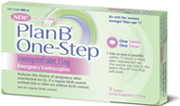
26850 Providence Parkway Suite #300, Novi, MI, 48374
Phone: 248.348.4200
Fax: 248.380.6457

Gavini Pediatric & ADHD Clinics26850 Providence Parkway, Suite 300, Novi, MI 48374 :: 248.348.4200www.ADHDclinic.com :: www.YourKidsDoctor.com |
|
|---|---|
Adolescent - Emergency ContraceptiveIf you have had sex in the last 5 days:Did you or your partner use any form of birth control to prevent pregnancy? If no, there's a chance you could get pregnant.If you and your partner used a condom as your only method of birth control, did it rip or slip during sex? If yes, there's a chance you could get pregnant. If you did use a method of birth control (birth control pills and condoms) to prevent pregnancy, did you use it correctly? If no, there's a chance you could get pregnant. Even if you and your partner used a or multiple forms of birth control correctly, there is always a chance that you can become pregnant. |
|
You could be at risk of getting pregnant if...
What is emergency contraception? Emergency contraception is a type of birth control used to prevent pregnancy after unprotected sex. |
|
How do the pills work?Emergency contraception pills can prevent:
|
|
|
What types of pills can I take?Your pediatrician may prescribe one of the following:
|
|
Are the pills safe?Emergency contraception pills are safe but as with all medicines there can be side effects. Nausea and vomiting may occur but are less likely with the Plan B progestin-only pill. Other side effects include fatigue, tender breasts, headache, stomach pain, and dizziness. These side effects usually last less than 24 hours. You may notice changes in your next period. Your period may come earlier or later, or be lighter or heavier than you're used to. The pills won't hurt your ability to get pregnant in the future. Because the pills won't protect you from getting pregnant the next time you have sex, you must still use your usual form of birth control. Call your pediatrician if you vomit within 30 to 60 minutes after taking the pills, or if you have any other concerns. It is critical to call your pediatrician for an appointment within 2 weeks after taking emergency contraception. At the visit you can get a pregnancy test to make sure you did not get pregnant and a test for STDs.Where can I find more information? Always feel free to share your concerns and questions with your pediatrician. If you'd like to do some reading on your own, you may want to contact one of the following sources: The American College of Obstetricians and Gynecologists www.acog.org DuraMed Pharmaceuticals 800/330-1271 www.planbonestep.com Emergency Contraception Hot Line 888/NOT-2-LATE Emergency Contraception Web Site ec.princeton.edu International Consortium for Emergency Contraception www.cecinfo.org Managing Contraception www.managingcontraception.com The National Women's Health Information Center 800/994-WOMAN (800/994-9662) www.womenshealth.gov/ Planned Parenthood www.plannedparenthood.org |
|
REMEMBER!Always use a condom to reduce the risk of getting an STD. Condoms work best when they are used the right way. No other form of birth control, including emergency contraception, can protect you from getting an STD.Make sure that you are checked for an STD. If you had unprotected sex, not only can you become pregnant, you could also get an STD. Often a simple urine test can screen for STDs. Don't be afraid to say NO if you've changed your mind and don't want to have sex. It's best to stay away from situations that can lead to sex when you don't feel ready. Drinking alcohol and using drugs may lead to you having sex when you don't mean to. It's never OK for someone to pressure you to have sex. |
|
